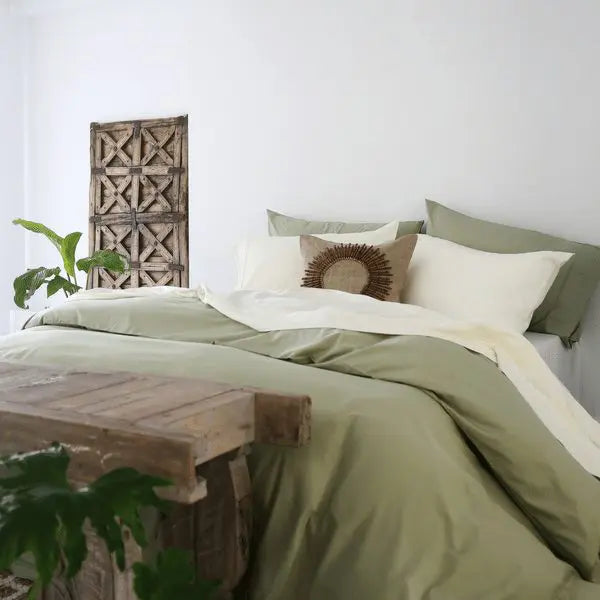Bamboo sheets vs cotton sheets: which sheets are better?
Bedding plays a huge role in the comfort and quality of your sleep. This may have you asking - which is better, bamboo sheets or cotton sheets? Both have very distinct merits in terms of comfort, luxury, and durability, but having all the facts may make the decision much easier when it comes time to buy. So, let’s take a deep dive into the benefits of bamboo sheets vs. cotton sheets and see how they both stack up!
What are Bamboo Sheets?
Bamboo sheets are made out of bamboo fibers, which are spun into yarn and processed to create threads. These bamboo threads are then woven into luxuriously soft bamboo sheets, bamboo doona covers, bamboo towels, and more!There are three types of bamboo fibers. The overall process used in the manufacturing of these fibers is what makes them distinct from one another. Let's dive into their unique characteristics below:
Types of Bamboo Sheets
- Rayon/Viscose - This type of bamboo sheet is made from bamboo rayon. Bamboo sheets made of Rayon/Viscose have natural hypoallergenic properties making them the best bed sheets for people with sensitive skin - including babies, or people with skin conditions like eczema. Aside from this, they are also very absorbent. Because of this, dyes can be absorbed easily, allowing manufacturers to produce a wide variety of colour options.
- Lyocell - Bamboo Lyocell or also known as Tencel, is made from bamboo cellulose. Lyocell fabrics are an eco-friendly option for environment-conscious individuals as the solutions used in manufacturing them are non-toxic - which is great news when you’re spending so much time wrapped up in your sheets!
- Bamboo Linen - Bamboo linen is produced mechanically without chemicals following the same manufacturing process used in producing common linen fabrics. Bamboo linens are very sustainable fabrics. However, they feel coarser to touch, similar to linen, compared to the other types of silky smooth bamboo bed sheets. Bamboo linen sheets also tend to wrinkle easily, which isn’t the look that everyone is going for.

What are Cotton Sheets?
Cotton is the most popular type of fabric used for bed sheets. Cotton sheets use natural fibers from the cotton plant resulting in soft, durable, and low maintenance fabrics. There are two known supreme quality cotton sheets available in the market, the Egyptian and Pima cotton. They are both known for their high-quality, soft sheets with extra-long fibers.
Types of Cotton Sheets
- Egyptian - 'Egyptian' cotton was derived from the origin of the plant used to create cotton. Egyptian cotton is known for its extra-long staples, resulting in exceptionally comfy fabric. This type of cotton is widely regarded as the best when it comes to durability, but Egyptian cotton sheets still aren’t as soft as bamboo sheets.
- Pima - Pima sheets are another popular type of cotton material available on the market. They feel somewhat rougher than Egyptian cotton sheets but are still soft to touch. Pima cotton also has an extra-long staple. They are grown in the southwestern United States, Peru and Australia. They get softer with every wash and may feel nicer over time.

What is better, Bamboo or Cotton Sheets?
Thread Count
Thread count refers to the number of horizontal and vertical threads per square inch. In the case of cotton sheets, it is generally considered that a higher thread count produces a higher-quality, and also more expensive, product.
In terms of thread count though, bamboo sheets and cotton sheets differ greatly. High-quality Egyptian cotton sheets can be as high as 700. On the other hand, bamboo sheets have a lower thread count usually within the range of 250 and 350. However, bamboo fibers are naturally softer, lightweight and more breathable than even the most expensive, high-thread count cotton.
In that sense, thread count isn’t an accurate comparative measure for bamboo and cotton, as bamboo sheets are naturally softer than cotton sheets.
Softness & Comfort
High thread count cotton sheets have traditionally been seen as the “king” of comfort, but there are many comfort advantages to bamboo sheets that make them softer than cotton.
Whilst cotton sheets promise to become softer overtime and with every wash, bamboo sheets are already silky-soft and sustain their softness no matter how long you own them. As they are also highly durable (more on that below), washing bamboo sheets will not change their luxurious feel or soft texture, so you can always look forward to slipping into the sweet comfort of your sheets.
Another advantage of bamboo sheets is that they keep you cooler than cotton sheets. As bamboo is a natural fiber, they have the ability to thermoregulate, keeping you warm in winter and cool in summer. Cotton sheets, even high-thread count cotton sheets, retain heat more than bamboo sheets, which are light, breathable and moisture-wicking. Bamboo sheets also absorb moisture instantly and remove excess heat, which is great for hot-sweaty sleepers and keeping you cool all year round.
Durability
When you invest in high quality sheets, or even duvets, you want to know that they’ll last. So how does bamboo and cotton compare when it comes to durability?
The durability of cotton bed sheets largely depends on their thread count. Lower thread count cotton sheets are not as durable and tend to pill. To ensure you have the longest-lasting cotton sheets, you often pay a premium - but even this gives no guarantee of durability.
Bamboo sheets, on the other hand, are extremely durable due to the nature of their naturally long fibers. Bamboo threads are as long as the entire sheet, whereas cotton sheets are made of shorter fibers woven together - hence the higher thread count. Since they are made with longer fibers, bamboo sheets are far less likely to tear than cotton sheets, so you will be able to enjoy them for much longer.
Health benefits
We’ve already mentioned that bamboo sheets are softer and more durable than cotton, but did you know bamboo is also great for people with allergies? The natural fibres that make bamboo breathable and moisture-wicking also make it hypoallergenic and antibacterial. Bamboo prevents the growth of bacteria in your bed, as well as reduces the smell of body odor that often clings to cotton sheets.
Bamboo’s moisture-wicking abilities also keep the dust-mites away, which are a key trigger for people with allergies. Last but not least, the softness of bamboo is great for people, or young children with sensitive skin, including conditions such as eczema. Whilst high thread count cotton sheets can also be great for people with sensitive skin, the benefits typically come with a hefty price tag. Cotton production, as we’ll cover below, can also involve the use of harmful pesticides and chemicals - whereas bamboo is 100% all-natural and completely free of health-harming pesticides and chemicals.
Cost
Quality cotton sheets and bamboo sheet sets are comparable in price, especially when looking at the higher end of the scale. In many cases, bamboo sheets are more expensive than cotton sheets, but it is an investment in comfort, health and sustainability that you will not regret for a moment. The fact is, you will have your bamboo sheets for much longer than a comparable set of cotton sheets, meaning they provide much better value over the long term.
Environmental Impact
Not only are bamboo sheets good for you, they are also good for the planet. Bamboo is more environmentally friendly than cotton, and offers many distinct advantages. For example, bamboo is a sustainable, renewable resource that has been proven to reduce carbon emissions. It does not require excessive water, pesticides or harmful chemicals to grow or produce it.
Cotton production, on the other hand, typically requires a lot of water - according to the WWF just a cotton t-shirt can require 2,700 litres of water! Now imagine a whole cotton bed set. Cotton plants are also more susceptible to various pests, requiring chemical intervention.

Conclusions
There’s a lot to consider when it comes to Bamboo vs Cotton sheets. But if you are looking for soft, luxurious comfort, durability, health benefits, and a product that is actually better for the planet - all evidence points to bamboo sheets as the clear choice over cotton sheets.
Learn More
Which is softer bamboo or cotton?
Compared to regular cotton, bamboo will always be softer to touch. Remember that thread count is important in assessing the quality of cotton fabrics a high thread count is needed for it to be considered really soft. Whilst a higher-end range like Egyptian cotton is known for its superior softness, it also comes with a high price tag.
Does bamboo breathe like cotton?
Bamboo is more breathable than cotton and helps regulate your body heat. This feature allows you to stay cool and dry on warm days and warm during colder months. Cotton clothing made from high-quality cotton fabrics will also breathe well. However, where cotton often falls behind is due to bamboo’s moisture-wicking properties which instantly absorbs moisture and removes excess heat. During hot summer nights our bodies will typically sweat, so wearing a material that won’t absorb moisture quickly can feel uncomfortable. Bamboo is more absorbent than even the higher-end cotton. It wicks moisture away from the skin much faster and keeps you dry and comfortable.
Is bamboo better for young children?
Bamboo is naturally hypoallergenic and anti-bacterial, which is important for helping to manage young children with allergies. Bamboo absorbs 40 percent more water than cotton, which removes unwelcome bed visitors such as dust-mites, and prevents the growth of bacteria. The soft, breathable bamboo fibres also help children who may have sensitive skin, or suffer from conditions like eczema. As young children are unable to regulate their own body temperature, fabrics such as cotton that sustain heat can often cause excess sweating and for eczema sufferers, this leads to skin irritation. Bamboo’s thermoregulating qualities means that it does not trap heat, helping young children stay cool and rash-free!
Looking for $15 off to try bamboo bedding?
Feeling lucky? Enter our monthly giveaway for your chance to try Bamboo Sheets for yourself! Enter Now
See what people are saying about our bamboo sheets.


